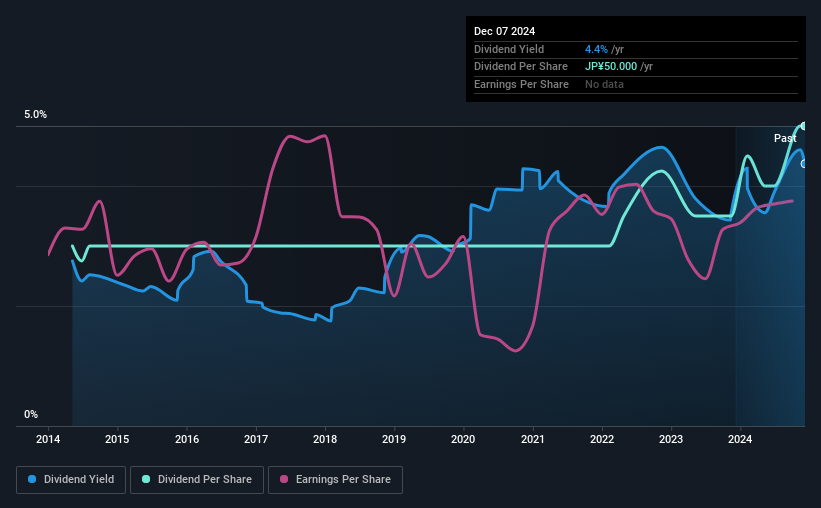
The board of The Shikoku Bank, Ltd. (TSE:8387) has announced that it will pay a dividend on the 30th of June, with investors receiving ¥25.00 per share. This will take the annual payment to 4.4% of the stock price, which is above what most companies in the industry pay.
View our latest analysis for Shikoku Bank
Shikoku Bank's Earnings Will Easily Cover The Distributions
Impressive dividend yields are good, but this doesn't matter much if the payments can't be sustained.
Shikoku Bank has a long history of paying out dividends, with its current track record at a minimum of 10 years. While past data isn't a guarantee for the future, Shikoku Bank's latest earnings report puts its payout ratio at 13%, showing that the company can pay out its dividends comfortably.
Looking forward, earnings per share could rise by 6.7% over the next year if the trend from the last few years continues. Assuming the dividend continues along recent trends, we think the future payout ratio could be 27% by next year, which is in a pretty sustainable range.

Dividend Volatility
The company's dividend history has been marked by instability, with at least one cut in the last 10 years. The annual payment during the last 10 years was ¥30.00 in 2014, and the most recent fiscal year payment was ¥50.00. This works out to be a compound annual growth rate (CAGR) of approximately 5.2% a year over that time. We like to see dividends have grown at a reasonable rate, but with at least one substantial cut in the payments, we're not certain this dividend stock would be ideal for someone intending to live on the income.
Shikoku Bank Could Grow Its Dividend
With a relatively unstable dividend, it's even more important to evaluate if earnings per share is growing, which could point to a growing dividend in the future. Shikoku Bank has seen EPS rising for the last five years, at 6.7% per annum. A low payout ratio and decent growth suggests that the company is reinvesting well, and it also has plenty of room to increase the dividend over time.
Our Thoughts On Shikoku Bank's Dividend
In summary, it's great to see that the company can raise the dividend and keep it in a sustainable range. While the payout ratios are a good sign, we are less enthusiastic about the company's dividend record. The dividend looks okay, but there have been some issues in the past, so we would be a little bit cautious.
Market movements attest to how highly valued a consistent dividend policy is compared to one which is more unpredictable. At the same time, there are other factors our readers should be conscious of before pouring capital into a stock. For example, we've picked out 1 warning sign for Shikoku Bank that investors should know about before committing capital to this stock. If you are a dividend investor, you might also want to look at our curated list of high yield dividend stocks.
New: Manage All Your Stock Portfolios in One Place
We've created the ultimate portfolio companion for stock investors, and it's free.
• Connect an unlimited number of Portfolios and see your total in one currency
• Be alerted to new Warning Signs or Risks via email or mobile
• Track the Fair Value of your stocks
Have feedback on this article? Concerned about the content? Get in touch with us directly. Alternatively, email editorial-team (at) simplywallst.com.
This article by Simply Wall St is general in nature. We provide commentary based on historical data and analyst forecasts only using an unbiased methodology and our articles are not intended to be financial advice. It does not constitute a recommendation to buy or sell any stock, and does not take account of your objectives, or your financial situation. We aim to bring you long-term focused analysis driven by fundamental data. Note that our analysis may not factor in the latest price-sensitive company announcements or qualitative material. Simply Wall St has no position in any stocks mentioned.
About TSE:8387
Shikoku Bank
Provides various commercial banking products and services for individual and corporate customers in Japan.
Good value average dividend payer.
Market Insights
Community Narratives



